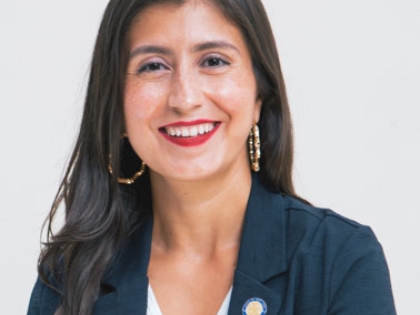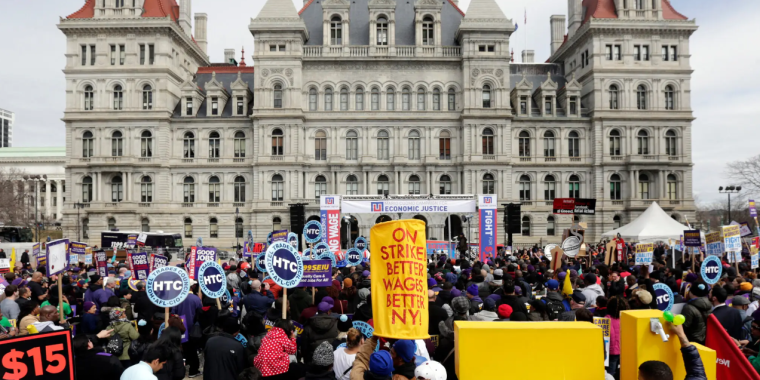
STATEMENT: Senator Ramos on Passage of one-house budget
March 14, 2022
FOR IMMEDIATE RELEASE: 3/14/2022
CONTACT: Astrid Aune, aaune@nysenate.gov
SENATOR RAMOS ON PASSAGE OF SENATE ONE-HOUSE BUDGET
QUEENS, NY - Following the release of the Legislature’s one-house budgets, Chair of the Senate Labor Committee Jessica Ramos (D, WF - SD13) issued the following statement:
“Since Governor Hochul released her Executive Budget in January, our work in the Legislature has been to get everyone on the same page about what a just recovery means in practice. There are promising wins in the Senate’s one-house budget - measures that I have been championing, including:
Expanded access to child care infrastructure by using the framework of S7615:
- Increased income eligibility for subsidized care to 300% of the Federal Poverty Level, and 100% coverage for families earning up to 500% for children up to 5 years of age, regardless of immigration status
- $250 million to aid localities statewide in fully implementing Universal Pre-K over the next two years
- Eliminated the work requirement for eligibility and extended eligibility to undocumented New Yorkers
- Workforce stabilization grants to aid in both capital funding and workforce recruitment, training, and retention efforts
- Provided $10.2 million for Child Advocacy Centers
- Invested a historic $4.1 billion over four years to reform and expand New York’s child care system:
- $2.2 billion in SFY 2022-23;
- $3.7 billion in SFY 2023-24 and
- $4.1 billion in SFY 2024-25 and thereafter
- Expanded access to subsidized child care statewide for households earning up to 500 percent of the federal poverty level ($138,750 for a family of 4), to be phased in over the next three years for children up to five years of age or until the end of their first year of eligibility for kindergarten
- Households with incomes between 300 percent and 500 percent of the federal poverty level would not have co-payments of more than 10 percent of their household income
- Provided workforce stabilization grants to child care providers and grants for child care infrastructure in both capital funding and assistance with recruitment, training, and retention of child care providers
- Provided $200 million to support the construction, conversion, and rehabilitation of properties to create and expand access to child care
A just transition to a green economy driven by investments in labor:
- $22.5 million for the Cornell School of Industrial and Labor Relations to fund the Climate Jobs Institute and a Cannabis Workforce Initiative
- $50 million for workforce training to facilitate a just transition to a green economy, including electric bus maintenance and repair
- A prevailing wage in the Environmental Bond Act
- $50 million hurricane disaster relief to help Hurricane Ida recovery
Continued progress on the Farm Workers Fair Labor Practices Act:
- Solidified the 10-year path to a 40-hour workweek for farmworkers with a tax credit for farmworker retention during the transition
- Provided funding to the Public Employees Relations Board (PERB) to enforce the Farmworkers Fair Labor Practices Act and make sure more unions like RWDSU Local 338 at Pindar Vineyards get certified sooner
- $10 million for BIPOC farming
Appropriations and policy that serves my constituents and our community:
- $125,000 for the Langston Hughes Library and Cultural Center and funding for adult literacy programming
- Inclusion of the Tibetan and Filipino communities in the AAPI Equity Budget, including the New York Tibetan Service Center and Little Manila Queens Bayanihan Arts
- Local control to allow New York City to establish scramble crosswalks in school zones for arrival and dismissal time
- The creation of a capital dashboard that will keep the public updated on the status and progress of MTA projects
- $1 million TGNC Wellness & Equity Fund
Billions for ERAP, Coverage for All, and Fair Pay for Home Care
The Senate Majority presents this one-house budget in the context of devastating inflation, an unemployment rate higher than the national average, and global uncertainty that will put more strain on the already compromised spending power of working-class New Yorkers. If this doesn’t warrant the use of rainy day investments to fuel recovery and future resilience in our most relied-upon and most vulnerable communities, I am afraid to discover what will.
There’s a lot here that has been hard-fought, and we should celebrate these wins as a means to sustain the next stage of necessary fights to come. Communities of color, and particularly women of color, know that when we all get only one bite at the apple, it still leaves many without their needs met. With no solution for excluded workers and no guaranteed living wage for child care workers, this recovery leaves us with work to do.
For the remainder of this session, I am laser-focused on passing legislation that will fill the gaps for working families left in this budget. The Senate’s task in the post-budget session will be to use the legislative mechanisms at our disposal to continue to deliver an economic recovery that leaves New Yorkers better off than they were before the pandemic. As I like to say: We all do better, when we all do better.”
####
related legislation
Share this Article or Press Release
Newsroom
Go to NewsroomRiders advocate for NYC transit service every six minutes
November 17, 2022
New York City, Once a Minimum Wage Leader, Now Lags Behind
November 14, 2022

EXCLUSIVE: MTA To Start Reopening Subway Bathrooms Early Next Year
October 24, 2022